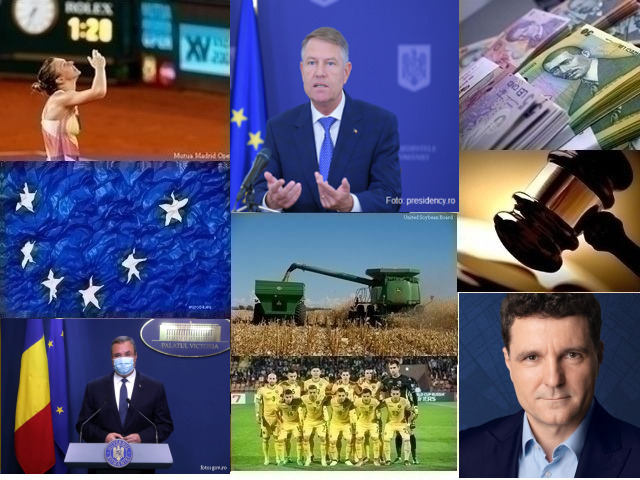February 5-11
A a look at the main headline-grabbing events this past week

Daniela Budu, 11.02.2023, 12:21
Romanias president at the European Council in Brussels
At the European Council in Brussels, the President of Romania, Klaus Iohannis, welcomed, together with other European leaders, the presence of the President of Ukraine, Volodymyr Zelenskiy, as further proof of European solidarity and unity and close coordination in support of the Ukrainian people in the face of the war started by the Russian Federation. In this context, the head of state emphasized the importance of maintaining the European support for Ukraine. He highlighted, at the same time, the solidarity showed by Romania, as a neighboring and friendly state, which has contributed both at humanitarian and economic level, as well as in terms of increasing connectivity, facilitating grain transport or supporting Kyivs European aspirations.
Klaus Iohannis also defended the need to keep putting pressure on Russia, including by adopting additional sanctions. In another move, the head of state announced that he will continue the discussions regarding Romanias accession to the Schengen area and said that he would soon travel to Bulgaria, to start a series of joint actions at diplomatic level together with his counterpart.
Klaus Iohannis: “Joining the Schengen area is important to me, to Romania and to the Romanian citizens. I dont want to link the discussion to a specific date, because, as we saw in December, such things cannot be tied to a certain date, because there are many European considerations here. Unfortunately, however, the decisions are also linked to some domestic policy issues in some member states. I believe that this is not good, but its something that cannot be ignored either. I discussed this matter with the president Rumen Radev and yes, we will also take joint action.”
According to the head of state, Romania is not a source of migration and is not a transit country. Klaus Iohannis added, in Brussels, that the problem is a European one and Romania wants to participate in finding the best solutions. He also said that migration and Schengen are to different matters.
Romanian stands by Turkey after the quake
Romania has joined the international teams and sent two search and rescue crews to the areas heavily affected by the earthquakes that hit southern Turkey. There are almost 120 Romanian rescuers on the ground, accompanied by seven specially trained dogs, who have managed to save several victims so far. The head of the Department for Emergency Situations, Raed Arafat, has given assurances that the Romanian rescuers will help Turkey for as long as it takes.
Raed Arafat: “Theyll stay there as long as it takes. If we need to exchange personnel or send logistical support further, this will happen quickly, with the support of our colleagues in the Air Force, in the hope that we will be able to save as many people as possible and, of course, provide the necessary support to the colleagues who are faced with an unprecedented situation”.
Moreover, Bucharest has already approved support for Syria, which was also heavily affected by Mondays earthquakes. Romania will help with materials, clothing and food. In another move, the Ministry of Foreign Affairs has repatriated several Romanian citizens who were in Turkey and who requested this after the earthquake. The Romanian Embassy in Ankara announced that it stays in contact with dozens other Romanians in that country.
The second Patriot system for Romania
This week, Romania has received the second Patriot system out of a total of four contracted under the Air Force equipping program. According to the Minister of Defense, Angel Tîlvăr, the Romanian military are taking part in an intensive training program to be able to use these anti-aircraft defense systems. The official has stated that equipping the Air Force with Patriot systems adds “a robust, credible, interoperable and flexible air defense capability, intended to help fulfill the missions of the Romanian Army”.
According to the Ministry of Defense, the latest generation of Patriot systems arrived in Romania for the first time in 2020, and this year the first stage of the equipping program will be completed. The delivery of the next two started last year and their testing and reception should be completed by the end of April. The first system delivered to the Romanian Air Force has performed, since 2021, specific anti-missile defense missions in the airspace of Romania and NATO.
7% key interest rate
After two years of record interest rates and 11 increases, the National Bank of Romania decided, like the other Central Banks in the region, to maintain the key interest rate at 7% per year. The Central Bank has also kept the current levels of the minimum reserve ratios for liabilities in lei and in foreign currency for credit institutions, i.e. those amounts that commercial banks are obliged to hold in the National Bank accounts. The National Banks decisions take place in the context in which the Bank expects the annual inflation rate to decrease faster than previously anticipated. The annual inflation rate fell slightly last December, reaching just over 16%. In addition, the Central Bank expects the indicator to reach a single digit in the third quarter of this year, amid the extension of energy price capping and compensation schemes. (MI)





























